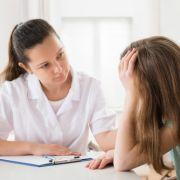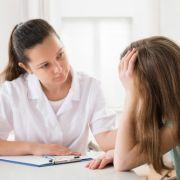What Is ADHD?
What Is ADHD?
posted: Feb. 21, 2022.
Attention-deficit/hyperactivity disorder (previously known as attention deficit disorder or ADD) is a neurobehavioral disorder characterized by core symptoms of inattentiveness, distractibility, hyperactivity, and impulsivity. ADHD is thought to be the most common childhood mental health disorder, with estimates of its prevalence in children ranging from 5 to 11 percent. ADHD in adulthood is thought to be less common, with approximately 2 to 5 percent of adults diagnosed.
ADHD symptoms can interfere with work, school, household tasks, and relationships, and managing the disorder can be a challenge for both children and adults. Fortunately, there are treatments that have been shown to be effective, and anyone affected by ADHD can learn coping skills to work around struggles and harness their talents—as many successful individuals with ADHD have already done.
What does ADHD look like?

Some children and adults with ADHD find it difficult to concentrate on tasks at school or work and may daydream frequently. Children with ADHD may become disruptive, defiant, or have trouble getting along with parents, peers, or teachers. Children who struggle with hyperactivity and impulsivity, in particular, often have behavioral challenges that can be difficult for adults to manage.
Adults, on the other hand, may be more likely to report feeling restless or fidgety; if they struggle with impulsivity, they may make rash decisions that adversely affect their life. For both children and adults, executive functioning (planning, emotional regulation, and decision-making) is often affected as well. Many children and adults display either hyperactive or inattentive symptoms of ADHD, but it’s also possible for both sets of symptoms to exist together, in what is typically called combined type ADHD.
For more on symptoms, see ADHD Symptoms and Diagnosis.
Is ADHD real?

Most psychiatrists and psychologists agree that ADHD is real. It runs in families (suggesting genetic roots) and neurological evidence has found it to be associated with alterations in brain growth and development. ADHD is also clearly linked to academic, work, and relationship problems—and responds to treatment—suggesting that it has clinical validity. But whether the disorder is overdiagnosed and overtreated—or whether it reflects a set of evolved traits that have become less adaptive in today’s world—is widely debated.
For more on the biology of ADHD, see Causes and Risk Factors in ADHD.
What causes ADHD?

Like many other mental health disorders, the causes of ADHD remain under investigation. Genes are theorized to play a key role, as are environmental influences such as exposure to toxins in the womb and early traumatic experiences. Since ADHD is a behavioral disorder, expectations of appropriate behavior, particularly in children, likely influence diagnoses in some cases.
For more on the causes of ADHD, see Causes and Risk Factors in ADHD.
How is ADHD treated?

Experts have debated whether treatment for ADHD should be primarily behavioral (therapy, attention training, increased play, greater structure) or pharmacological. Several large studies have concluded that a combination of both may be most effective.
For more on treatment options, see Treatment of ADHD.
How can I best help my child manage his ADHD?

All children benefit from love, structure, and consistency; children with ADHD need all three in droves. Since ADHD symptoms and their resulting academic and social challenges can be damaging to a child’s self-esteem, parents should take steps to find a treatment that works, help the child identify his strengths, and advocate for his needs as he learns to navigate the world on his own. Parents should also help the child set up routines, identify academic strategies that address her specific needs, and learn the social skills necessary in order to form lasting friendships.
For more about raising a happy and healthy ADHD child, see Parenting a Child with ADHD.
Is ADHD good or bad for romantic relationships?

There is no single way that ADHD affects romantic relationships, and the condition often comes with both positives and negatives. Many couples, for instance, find that one partner’s ADHD (or both, in some cases) enhances the relationship by making it more spontaneous or sexually fulfilling. Others, however, find that symptoms of distraction, disorganization, or impulsivity can lead to frustrating miscommunications between partners or trigger arguments.
Both partners—regardless of their own ADHD status—should be honest about any challenges that ADHD brings to the relationship, while also making an effort to appreciate its upsides whenever possible. Having compassion toward one’s partner is critical for making any ADHD relationship work.
For more on love and ADHD, see ADHD and Relationships.
Treatment of ADHD
Medication and behavioral treatments are both widely used to treat ADHD. While medication is often the first-line treatment, patients who receive behavioral treatments—typically therapy, parent training, or neurofeedback—often ultimately need less medication or are able to stop using it entirely. At the same time, several influential studies have concluded that the two treatment approaches may work best in tandem.
What is the best treatment for ADHD?
The best treatment plan for ADHD is unique to the individual, and typically includes a mix of medication, therapy, and/or lifestyle changes. Effective treatment should address both the underlying symptoms—like impulsivity or distractibility—as well as the resulting behavioral and social challenges (such as difficulties making friends, managing time, and poor self-esteem).
ADHD Medications
The most commonly used ADHD medications are stimulants such as Ritalin and Adderall. Non-stimulants like Strattera or certain classes of antidepressants can be used for those who don’t respond to stimulants or cannot tolerate them.
Whatever medication is used, it's important to receive the correct dosage, since ADHD medications, and stimulants in particular, can worsen other conditions that may co-occur with ADHD, including bipolar disorder, obsessive-compulsive disorder, and anxiety.
What stimulants are used to treat ADHD?
The main stimulant medications used to treat ADHD fall into two broad categories: methylphenidates and amphetamines.
Methylphenidate: Ritalin, Concerta, Daytrana, Focalin, Quillichew, Quillivant, Metadate
Amphetamine: Adderall, Dyanavel, Vyvanse, Dexedrine
Are stimulant medications dangerous?
Stimulant medications have been in use for decades, and though they may trigger side effects (such as headaches or irritability), most research has concluded that they are generally safe when taken appropriately. Children and adults with pre-existing heart conditions should work closely with their doctor, as stimulants can increase blood pressure or heart rate and may be dangerous for this group. Stimulants may also trigger tics, manic episodes, or, in rare cases, psychosis. In most cases, lowering the dose or changing medications should alleviate the issue.
Behavioral Treatments
Behavioral therapy is thought to be the most effective non-medical approach for children with ADHD. It typically trains parents to respond consistently to their child’s negative behaviors and help them set and meet goals, while teaching the child coping techniques and social skills. A common refrain in the ADHD community, “pills don’t teach skills,” highlights the fact that while medication may control symptoms of hyperactivity or inattention, it cannot necessarily help a child learn how to behave appropriately or break negative habits. Behavior therapy aims to fill that gap.
For adults and older children with ADHD, cognitive behavioral therapy is most often used. CBT therapists can help adults develop stronger emotional regulation, overcome bad habits, and confront negative patterns of thinking and poor self-esteem that may be impeding their success.
Can therapy help with ADHD?
Yes. For children, behavior therapy (typically with a parent-training element) has proven to be effective in many cases; for adults, CBT has been shown to help develop organizational skills and address maladaptive thought patterns. Other less structured forms of psychotherapy may also be useful for repairing damaged self-esteem and rebuilding relationships harmed by negative ADHD behaviors.
Is it possible to treat ADHD without medication?
Yes. Although most head-to-head studies have concluded that medication is generally more effective than other standalone treatments, it can trigger unpleasant side effects and is not necessary to manage ADHD. A combination of therapy, exercise, meditation, and dietary changes have proven effective for many children and adults with ADHD. Emerging research also suggests that technological treatments—such as specialized video games, brain training programs, or neurofeedback—may improve ADHD symptoms; most experts, however, argue that more research is needed.

Taken From:
https://www.psychologytoday.com/us/basics/adhd/causes-adhd
https://www.psychologytoday.com/us/basics/adhd/treatment-adhd
